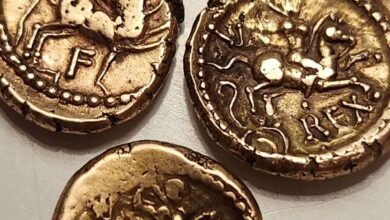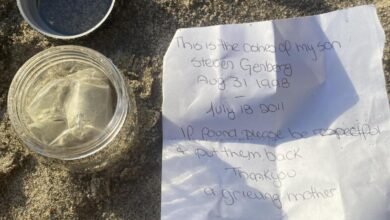Dorset is considered one of the best treasure hunting counties
The list shows that Dorset is ranked 13th among UK counties with a total of 12,924 finds
The data, compiled by travel expert Tim Schmidt of All Worlds, shows that 684,915 treasures were collected across all 109 British counties.
Last year, Martin Turner and his son Rhys, from Dorchester, fulfilled the metal detecting “dream” by finding 14 Bronze Age ax heads in a field in Dorset. These ax heads date from between 1400 and 1700 BC. BC and should be worth around £7,000.
Read more: Father and son find 14 Bronze Age ax heads in field

In 2016, metal detectorist Brian Read discovered a hoard of Roman coins in a field in Piddletrenthide. The coins – more than 2,000 examples were found in a pottery vessel – are the earliest products of the newly founded Roman mint in London.
Read more: Coin hoard found in Dorset field added to record treasure finds

Last year, Dorset Museum & Art Gallery began raising funds to preserve two rare treasure hordes in Dorset.
The first treasure is a group of 40 Iron Age gold staters found at Charlton Marshall, near Blandford. The coins were imported from France and date to the 2nd century AD. They were made by a Gaulish tribe called the Baiocasses and very few similar finds are known from Dorset and the south coast.

The second hoard is a Middle Bronze Age hoard found at Stalbridge, also in north Dorset. It consists of an ax head made of palstave, a bracelet with incised decoration and a rapier sword. It is considered an unusual find because it was apparently intentionally broken into three pieces and buried, but the handle was shaped to resemble a wooden handle.

Read more: Campaign to preserve rare archaeological treasures in Dorset
Tim Schmidt, founder of All Worlds, said: “Many people would like to discover a hidden diamond in their garden, many dream of it. Although it would be a fascinating find, unfortunately you would have to report the treasure to your local coroner within 14 days of finding it. Still, you can at least enjoy the fame of a treasure hunter and know that you were the one who found the treasure.
“Remember to have fun, be respectful of what you find, and make sure you have permission from the landowner before you begin searching for the buried treasure.”
Data collected by the British Museum’s portable antiquities and treasures department shows that 32 treasure discoveries were recorded in Dorset in 2022 – up from 31 the year before.



